
Product description
First News - Tri Viet Publishing Company
Author Viktor Emil Frankl
Published on 07-2019
Size 14.5 x 20.5 cm
Publisher: Ho Chi Minh City General Publishing House
Translators Multiple translators
Cover type: Softcover
Page number 220
SKU 2430502722588
In Search of Meaning
Viktor Frankl's *Man's Search for Meaning* is a classic of our time. Usually, if a book contains even just one paragraph, one idea, with the power to change a person's life, that alone is enough to warrant rereading and a place on one's bookshelf. This book has many such passages.
First and foremost, this is a book about survival. Like many Jews living in Germany and Eastern Europe at the time who thought they would be safe in the 1930s, Frankl endured the horrors of Nazi concentration and death camps. Miraculously, he survived; the phrase "tempered by steel" accurately describes his experience. However, in *Man's Search for Meaning*, the author focuses less on the hardships, suffering, and loss he endured, and instead writes about the sources of strength that helped him survive.
He bitterly recounts the prisoners who had surrendered to life, lost all hope for the future, and were surely the first to die. Few died from lack of food and medicine; most died from lack of hope, lack of a reason to live. In contrast, Frankl nurtured hope to survive by thinking of his wife and looking forward to their reunion. He even dreamed of lecturing after the war about the psychological lessons he had learned from Auschwitz. Clearly, many prisoners who desperately wanted to live died—some from illness, some from being burned alive. In this book, Frankl focuses on explaining why some people survived the Nazi concentration camps rather than explaining why most of them never returned.
The greatest task of each person is to find meaning in their life. Frankl identified three fundamental sources of meaning: achievement in work, caring for loved ones, and courage in the face of life's difficulties. Suffering, in itself, is meaningless; it is our response that gives it meaning. Frankl wrote that a person "can maintain courage, dignity, and tolerance, or he can forget his human dignity and sink to the level of beasts in the brutal struggle for survival." He acknowledged that only a few Nazi prisoners were able to maintain these qualities, but "even one such example is sufficient to prove that the inner strength of man can enable him to rise above his cruel fate."
Author Viktor Emil Frankl
Published on 07-2019
Size 14.5 x 20.5 cm
Publisher: Ho Chi Minh City General Publishing House
Translators Multiple translators
Cover type: Softcover
Page number 220
SKU 2430502722588
In Search of Meaning
Viktor Frankl's *Man's Search for Meaning* is a classic of our time. Usually, if a book contains even just one paragraph, one idea, with the power to change a person's life, that alone is enough to warrant rereading and a place on one's bookshelf. This book has many such passages.
First and foremost, this is a book about survival. Like many Jews living in Germany and Eastern Europe at the time who thought they would be safe in the 1930s, Frankl endured the horrors of Nazi concentration and death camps. Miraculously, he survived; the phrase "tempered by steel" accurately describes his experience. However, in *Man's Search for Meaning*, the author focuses less on the hardships, suffering, and loss he endured, and instead writes about the sources of strength that helped him survive.
He bitterly recounts the prisoners who had surrendered to life, lost all hope for the future, and were surely the first to die. Few died from lack of food and medicine; most died from lack of hope, lack of a reason to live. In contrast, Frankl nurtured hope to survive by thinking of his wife and looking forward to their reunion. He even dreamed of lecturing after the war about the psychological lessons he had learned from Auschwitz. Clearly, many prisoners who desperately wanted to live died—some from illness, some from being burned alive. In this book, Frankl focuses on explaining why some people survived the Nazi concentration camps rather than explaining why most of them never returned.
The greatest task of each person is to find meaning in their life. Frankl identified three fundamental sources of meaning: achievement in work, caring for loved ones, and courage in the face of life's difficulties. Suffering, in itself, is meaningless; it is our response that gives it meaning. Frankl wrote that a person "can maintain courage, dignity, and tolerance, or he can forget his human dignity and sink to the level of beasts in the brutal struggle for survival." He acknowledged that only a few Nazi prisoners were able to maintain these qualities, but "even one such example is sufficient to prove that the inner strength of man can enable him to rise above his cruel fate."




